
 |
 | 




 |


|
|  | |

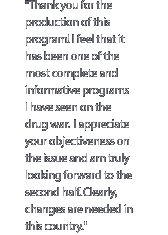

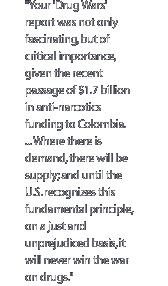 |

Drug Wars
October 9, 2000
 Veteran TV journalist and FRONTLINE correspondent Lowell Bergman had reported
on aspects of the international drug business before -- most notably in
FRONTLINE's award-winning "Murder, Money, and Mexico." Yet even he was
surprised at the scope of the international drug trade uncovered during the
production of FRONTLINE's four-hour documentary "Drug Wars." Veteran TV journalist and FRONTLINE correspondent Lowell Bergman had reported
on aspects of the international drug business before -- most notably in
FRONTLINE's award-winning "Murder, Money, and Mexico." Yet even he was
surprised at the scope of the international drug trade uncovered during the
production of FRONTLINE's four-hour documentary "Drug Wars."
"When you travel to a place like Culiacan, Mexico, it's a shock to find the
drug industry so ingrained in the popular culture that there's a patron saint
of drug smuggling -- Saint Jesus Malverde," Bergman says.
The first television history of America's thirty-year war on drugs, "Drug Wars"
traced the evolution of U.S. drug policy through the stories of those who lived
it: the DEA agents and law enforcement officials who fought the battle at home
and abroad; and the drug lords, smugglers, and users who fuel the $400 billion
international drug business.
The stories and comments elicited from these "drug warriors" were often
unexpected: from the international drug lords who claimed to be baffled by
Americans' fondness for cocaine, to the smugglers who matter-of-factly outlined
the production, shipment, and distribution methods of their underground
industry.
Perhaps most surprising were the comments made by longtime DEA agents and
officials, who said that the politically-popular method of fighting drugs
through drug seizures and stiff jail sentences simply hasn't worked.
"They all say that the real solution here is drug treatment, prevention, and
education -- that you can't arrest your way out of the problem," Bergman says.
"FRONTLINE's investigation revealed that almost everyone agrees how to solve
this problem, but in the end we don't have the political courage to do it."
visit "drug wars" site


| 
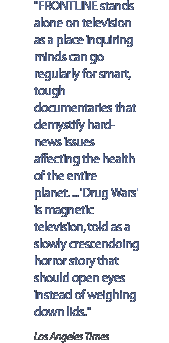 |
 |
|  | |
 |
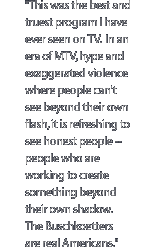

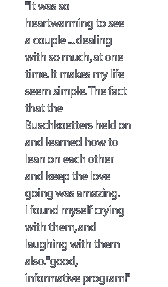

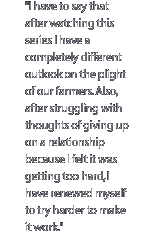 |
The Farmer's Wife
September 21, 1998
 In the fall of 1998, American embraced the Buschkoetters, the young Nebraska
couple whose struggle to save their family farm -- and their marriage -- was
chronicled in "The Farmer's Wife," a six-and-a-half-hour documentary from
FRONTLINE and the Independent Television Service. In the fall of 1998, American embraced the Buschkoetters, the young Nebraska
couple whose struggle to save their family farm -- and their marriage -- was
chronicled in "The Farmer's Wife," a six-and-a-half-hour documentary from
FRONTLINE and the Independent Television Service.
"An estimated 15 million Americans tuned in over three nights to witness Darrel
and Juanita Buschkoetter's daily battle to keep their dream of family farming
alive. Along the way, people from all walks of life found themselves
identifying with the couple's fight to keep their financial problems and
grueling schedules from destroying their marriage.
The response to "The Farmer's Wife" was immediate. In the days following the
series' premiere, FRONTLINE received more than ten thousand letters and emails,
and the Buschkoetters were inundated with cards, letters and phone calls --
many from viewers offering the family food, money ... even a new pickup truck
for their farm.
Producer David Sutherland -- who filmed more than two hundred hours of footage
of the Buschkoetters over three years -- says his goal was "to make you feel
that you're living in their skin. I wasn't interested in making a valentine or
exposé," he recalls. "I wasn't looking for a hero -- but I ended up with
two."
visit "the farmer's wife" site

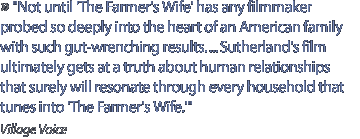
| 

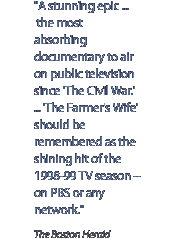 |
 |
|  | |
 |
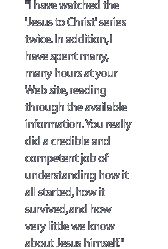

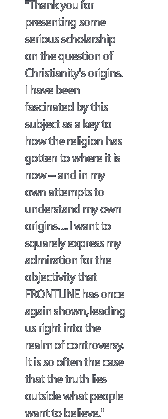 |
From Jesus to Christ
April 6, 1998
 FRONTLINE ventured into new territory with its four-hour long documentary "From
Jesus to Christ." Long recognized as PBS's premier investigative journalism
series, FRONTLINE had been searching for a project that would explore the
increasing power and significance of spirituality and religion in American
life. It found that project not in today's headlines, but in new discoveries
about the birth of Christianity and its development as a force that would
dominate Western culture for 2,000 years. FRONTLINE ventured into new territory with its four-hour long documentary "From
Jesus to Christ." Long recognized as PBS's premier investigative journalism
series, FRONTLINE had been searching for a project that would explore the
increasing power and significance of spirituality and religion in American
life. It found that project not in today's headlines, but in new discoveries
about the birth of Christianity and its development as a force that would
dominate Western culture for 2,000 years.
"From Jesus to Christ" would become the highest-rated FRONTLINE program of the
1997-1998 season.
"This film struck a chord with people from a wide variety of faiths and
beliefs," Executive Producer David Fanning says. "It is not a story of a golden
age of consensus, but a story of people in conflict -- it is the real story of
the rise of Christianity, challenging and upsetting conventional ideas."
The tremendous public response to the film didn't surprise religious studies
professor L. Michael White, the project's principal historical advisor. White
recalls believing from the outset that the truly intriguing story lay not in
the quest for the historical figure of Jesus, but in the story of how the
figure of Jesus came to be fashioned and refashioned throughout the development
of Christianity.
"It was the greatest story never told," he says. "Never, at least, in the
popular media."
visit "from jesus to christ" site

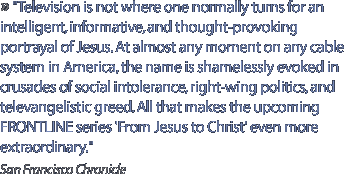
|  |
 |
|  | |
 |
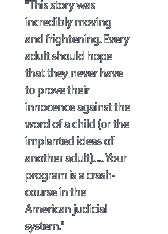

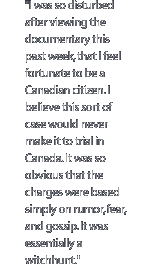 |
Innocence Lost Trilogy
May 7, 1991; July 20-21, 1993; May 27, 1997
 "When I first went to the small town of Edenton [North Carolina] in 1990, I
could never have believed that I would still be involved with the story seven
years later," FRONTLINE producer Ofra Bikel says. "A story which, in a way, is
the most extraordinary of all the stories I've ever come across." "When I first went to the small town of Edenton [North Carolina] in 1990, I
could never have believed that I would still be involved with the story seven
years later," FRONTLINE producer Ofra Bikel says. "A story which, in a way, is
the most extraordinary of all the stories I've ever come across."
Over the course of those seven years, Bikel would return again and again to
Edenton to chronicle the saga of the Little Rascals Day Care sexual abuse
scandal -- a case that many would later compare to the Salem Witch Trials. In a
documentary trilogy that won three duPont-Columbia awards, FRONTLINE followed
the Little Rascals case from the first claim of abuse in 1989 through numerous
trials, convictions, and plea bargains, raising questions about the methods
employed by investigators and the fairness of the trials.
Just days before the broadcast of the trilogy's final chapter, "Innocence Lost:
The Plea," prosecutors dropped all charges against the remaining defendants.
The sudden reversal caused the Washington Post to speculate that "one
reason for the plea bargain may have been that increasing publicity,
particularly in the TV series, had created some doubts ... as to the fairness
of the trials."
One Little Rascals defense attorney went even further: "Our Rascals defendants
are free," he wrote FRONTLINE, "because of you."
visit "innocence lost" site

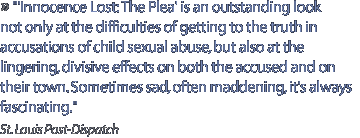
| 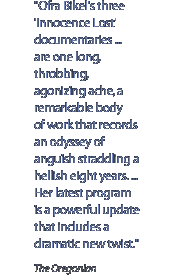 |
 |
|  | |
 |
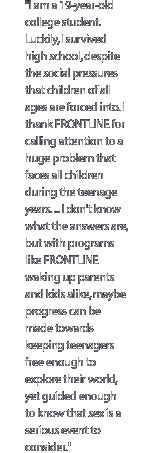

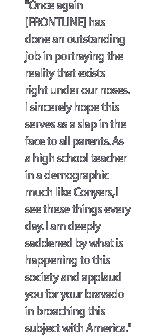 |
The Lost Children of Rockdale County
October 19, 1999
 Husband and wife producers Rachel Dretzin and Barak Goodman first traveled to
affluent Conyers, Georgia, to chronicle an all-too-typical American town where
teen loneliness and alienation were escaped through drinking, drugs, and
promiscuous sex. Husband and wife producers Rachel Dretzin and Barak Goodman first traveled to
affluent Conyers, Georgia, to chronicle an all-too-typical American town where
teen loneliness and alienation were escaped through drinking, drugs, and
promiscuous sex.
The couple ended up staying in Conyers for more than five months, getting to
know the teens and parents whose stories would be told in the Peabody
Award-winning "The Lost Children of Rockdale County."
"Wherever we went, we met kids who were drifting -- hungry for something to
fill the void left by too much time on their own and too little structure in
their lives," says Dretzin. "The result was these spasms of violence and sexual
precocity with little concern for the consequences."
That violence manifested itself on May 20, 1999 -- one month to the day after
the Columbine massacre -- when a sophomore at Conyers' Heritage High opened
fire, injuring six people. "We went running over there -- we were right there
just after it happened," says Goodman, who recalls being struck by how unfazed
his teen subjects were by the occurrence. "The fact of the shooting was just
another thing -- they weren't particularly shaken by it," he says. "Which was
very shaking to me."
visit "the lost children of rockdale county" site


| 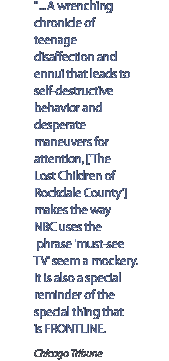 |
 |
|  | |
 |
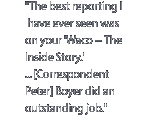

 |
Waco -- The Inside Story
October 17, 1995
 When FRONTLINE producer Michael Kirk and correspondent Peter Boyer first began
to plumb the depths of the FBI's disastrous assault on the Branch Davidian
compound at Waco, Texas, they never expected to uncover the vast archive of
untapped government files that would form the basis for "Waco -- The Inside
Story." In addition to thousands of pages of documents, Kirk and Boyer
uncovered stacks of FBI videotapes, dozens of autopsy photographs, and hundreds
of hours of previously undisclosed audiotapes of FBI negotiations with cult
leader David Koresh. This vast wealth of documentary evidence -- combined with
exclusive FRONTLINE interviews with key figures involved in the standoff --
would paint the most comprehensive portrait to date of what really happened
behind the scenes in the days and weeks leading up to the fateful siege. When FRONTLINE producer Michael Kirk and correspondent Peter Boyer first began
to plumb the depths of the FBI's disastrous assault on the Branch Davidian
compound at Waco, Texas, they never expected to uncover the vast archive of
untapped government files that would form the basis for "Waco -- The Inside
Story." In addition to thousands of pages of documents, Kirk and Boyer
uncovered stacks of FBI videotapes, dozens of autopsy photographs, and hundreds
of hours of previously undisclosed audiotapes of FBI negotiations with cult
leader David Koresh. This vast wealth of documentary evidence -- combined with
exclusive FRONTLINE interviews with key figures involved in the standoff --
would paint the most comprehensive portrait to date of what really happened
behind the scenes in the days and weeks leading up to the fateful siege.
Many of the files used in researching the documentary -- including excerpts
from the FBI's audiotaped negotiations with Koresh -- can be found on the
film's companion Web site at www.pbs.org/frontline. In fact, "Waco -- The
Inside Story" bears the distinction of being not only the first FRONTLINE
documentary to feature an accompanying Web site but also the first content-rich
editorial Web site in history. "We entered this new world of online publishing
because our documentaries, often a year in the making, generated huge amounts
of corollary research that simply couldn't all be put into an hour-long film,"
executive producer David Fanning recalls. "By collecting all these interviews
and tapes and materials and posting them on the Web site for the world to study
and understand, we make our journalism transparent. It's a way for us to say,
'We feel comfortable enough with what we've said in this documentary that you
can review the underlying materials and come to understand them in the way we
have.'"
visit "waco -- the inside story" site


| 


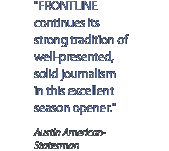

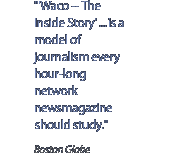 |

20 years / 420 programs » a conversation with david fanning » highlights » FRONTLINE's impact » a short history
our audience » awards » things you might know
FRONTLINE home » pbsi » wgbh
web site copyright WGBH educational foundation |
 |  |  |  |
|

